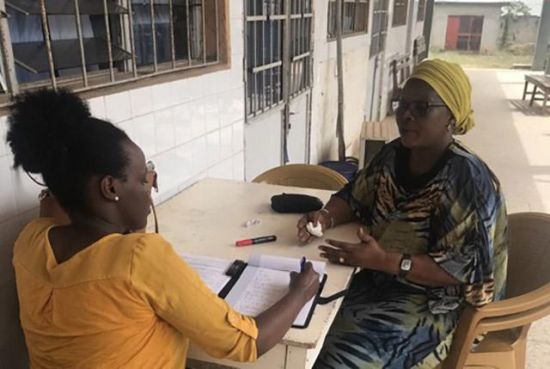NEWS RELEASE
Stigma, lack of support limit HIV testing in Côte d’Ivoire
Collaboration finds that improved training and support of community health workers are needed to improve HIV testing.
Written by Michael McCarthy
 Courtesy Dr. Mugisha Courtesy Dr. Mugisha
An interview with a Côte d’Ivoire healthcare provider to learn her ideas on improving HIV testing rates
February 8, 2023
— To improve HIV testing rates in the West African country of Côte d’Ivoire, community health workers need more training and support, researchers from the University of Washington School of Medicine in Seattle and the Institute de Recherche et Actions en Afrique, Abidjan, Côte d'Ivoire report in a new study. The scientific paper appears in the Feb. 8 issue of the journal PLOS ONE.
HIV testing is a vital element of the Joint United Nations Program on HIV and AIDS effort to end the HIV/AIDS epidemic. As part of its fast-track initiative, the program set standards to achieve what it calls its “95-95-95” targets by the year 2030. These targets are defined as: 95% of people infected with HIV would know they are infected, 95% of those who know they are infected would be on treatment, and 95% of those on treatment would achieve suppression of the virus. To achieve these 2030 targets, a successful policy would begin with a good system to identify HIV positive individuals.
In this study, the team of researchers sought to determine, from the perspective of healthcare providers in Cote d’Ivoire, major challenges to identifying people infected, given that less than 40 percent of people with HIV infection knew theywere infected.
“We need to identify people who are infected if we are going to treat them, but identification can be the hardest of the three 95 percent goals to achieve,” said Dr. Nancy Mugisha, the lead author and a fellow in Global and Rural Health in the Division of Allergy and Infectious Diseases, Department of Medicine, at the University of Washington School of Medicine.
Global and Rural Health Fellow Dr. Nancy Mugisha, an internal medicine physician.
Mugisha was born and raised in Burundi, and moved to Texas after high school. She recently finished her internal medicine residency at the UW School of Medicine.
To find out why Côte d’Ivoire was struggling to achieve the first 95% target, Mugisha collaborated with colleagues at Health Alliance International and the Institute de Recherche et Actions en Afrique to conduct interviews in French with more than 100 healthcare providers (physicians, nurses and community health workers) working in 16 rural health facilities in four health regions of the country. They wanted to understand the work they to the identify people infected with HIV and the challenges they face.
The interviews focused on the challenges for implementing a strategy called “index testing.” With this strategy, when a person with HIV infection is identified (the so-called “index case”), clinic and community health workers then seek to identify and test people who have had close contact with the index case. These individuals could be their children or siblings,their sexual partners, or people with whom they might have shared syringes. Although the index testing strategy has had success in several African countries, at the time of the study, the effort in Côte d’Ivoire was falling short.
The researchers found that most of the index testing outreach efforts fell to the non-clinician health counselors.
“Lay providers are implementing these programs,” Mugisha said. “Physicians and nurses have a lot on their plates treating patients. It is common in global health programs to have a lot of task shifting to people who do not necessarily have medical training.”
In general, the community health workers who carried out the index testing program preferred a passive referral strategy, where the index client brought their contacts into the health facility to be tested, followed by the provider referral in which the healthcare worker reached out directly. The other strategies were employed much less often.
With regard to the greatest challenges the community health counselors faced in implementing the index testing strategy, they talked about their clients’ fear of the stigma associated with HIV infection, with index cases fearing they will be abandoned by their partners and shunned by society should their diagnosis become known. A significant part of the problem is that many in these rural communities still think of HIV infection as they did in the 1990s when there were no effective treatments, said Mugisha.
“The 1990s is when most people first heard about HIV and that image of the disease has stuck in their minds, even though we can now control the infection with medications allowing people to lead a normal life,” she said.
The study was part of a project led by Ahoua Koné, a Seattle lawyer and clinical assistant professor of global health at the UW School of Medicine and UW School of Public Health. At the time she was the director of the Côte d’Ivoire HIV prevention and treatment program at Health Alliance International. The study was conducted on the behalf of Health Alliance International through funding from the U.S. Centers for Disease Control and Prevention as part of the U.S. President’s Emergency Plan for AIDS Relief.
Mugisha said she would like to thank the Côte d’Ivoire Ministry of Health, the health care providers and community counselors who gave so much of their time for this study and her co-authors, particularly Koné and family physician Dr. Stephen Gloyd, professor of global health and of health systems and population health at the UW, for their support.
MEDIA CONTACT:
Leila Gray,
206.475.9809
leilag@uw.edu
"Reproduced with permission - UW Medicine "
UW Medicine
Source: UW Medicine https://newsroom.uw.edu/news/stigma-lack-support-limit-hiv-testing-c%C3%B4te-d%E2%80%99ivoire
For more HIV and AIDS News visit...
Positively Positive - Living with HIV/AIDS:
HIV/AIDS News
|